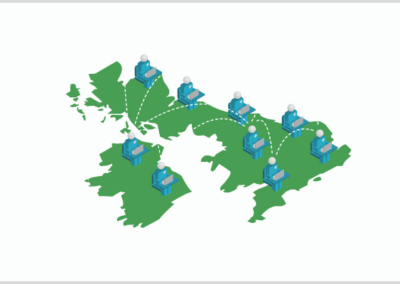‘Bypass Numbers save me time looking for a telephone number and I’ve always found those answering to be very helpful, and there are no delays.’
Consultant Connect’s Enhanced Advice & Guidance platform connects clinicians with specialists for rapid advice, but the service isn’t exclusively for Primary Care to contact Secondary Care.
One of the most popular uses of the free Consultant Connect App is the pre-programmed Bypass Numbers feature, which allows healthcare professionals in participating areas to skip the queue on switchboard and speak directly to staff at local GP practices.
In Wales, Bypass Numbers are used for same-day emergency communications, and we spoke with three users in Swansea Bay University Health Board, to find out how Bypass Numbers fit into their role and what impact this has on them, their workload, and their patients.
Scott Morgan is an office manager at a GP surgery in Swansea who answers bypass calls which come directly through to him:
‘With GP surgeries, the most important thing for staff is the awareness of what they’re used for and that they’re answered quickly. It’s imperative that when healthcare professionals from outside our surgery need to contact us, they can get through appropriately and timely.
‘Mondays and Fridays are usually the busiest days, and most of our calls come from Welsh Ambulance Services NHS Trust (WAST) clinicians. However, calls can come from consultants, the district nursing team, and cluster paramedics, to name a few. Bypass Numbers makes it easy for healthcare professionals to get through to us without needing to wait on the public line.’
What types of calls do you receive?
‘Usually, the clinicians are calling regarding patients who don’t want to go to hospital and would prefer to be treated within the community. These are patients who might be older and frailer or have long-term conditions. For instance, the ambulance service might have received an emergency call from a patient, and once they’ve assessed the patient, it’s been decided that hospital isn’t the most appropriate place for them. With input from the patient’s GP, this is the most effective way of ensuring they stay out of hospital.’
How are the calls managed?
‘Once I answer the calls, the majority of them end up going to the on-call doctor. If they’re available to take the call, I transfer the caller through at that time. If the doctor is on a house call, or if practice-based clinicians are busy with a patient, I’ll arrange for a call-back. We try to find a first-time solution as much as possible because the aim of the line is to resolve the query as quickly as we can.
‘Bypass Numbers help with everyone’s workloads. Everyone at the practice is happy to facilitate the outcome of bypass calls, whether it’s the district nursing team asking about medication, in which case they would be transferred to the medicines management team, or paramedics discussing outcomes or treatment plans. The resolution is dictated by the type and urgency of the call. Some queries I can answer without further clinical input, but we always aim to involve the correct healthcare professional the first time where needed.’
Aled Williams and Manie Tang, Paramedic for WAST and Cluster Paramedic, respectively, both use Bypass Numbers to speak with local GP practices regarding patients:
Why do you like using Bypass Numbers?
‘Bypass Numbers within Consultant Connect are my first port of call if I need to contact GP surgeries quickly because all the contact numbers are in one place within the Consultant Connect App. The app also has a great search function to locate a specific practice, so I don’t need to endlessly scroll for a telephone number. Even if the practice doesn’t have a Bypass Number available, the reception number is clearly displayed on the app, which saves me searching for an alternative telephone number elsewhere. It’s definitely a useful tool.’
– Aled Williams.
‘Using Bypass Numbers via the Consultant Connect App is my go-to for ringing local GP practices. It saves me time looking for a telephone number because I just need to press one button to make a call, and I’m connected. I’ve always found those answering bypass calls to be very helpful, and there are no delays. I’m either put through to the on-call doctor straight away or put on the call-back list. I always have a positive experience.’
– Manie Tang.
What types of calls do you use Bypass Numbers for?
‘Now that I’m a paramedic for a cluster of practices and I conduct the home visits, I always need to contact my patients’ practices for senior opinions or prescriptions. The patients I visit can’t get to their local GP surgery, so they might be bed-bound, due to being frail, elderly or because of a disability. They often have poor mobility and are generally unwell. I visit them for face-to-face assessments, and if they have worsening symptoms, the Bypass Numbers are brilliant for quickly contacting their GP.’
– Manie Tang.
‘I use the Bypass Numbers function within the Consultant Connect App quite frequently when I’m on-scene with patients who have phoned for an emergency ambulance, especially during GP surgery office hours. If I need advice on conveyance or to arrange a GP or district nurse follow-up appointment, I always use Bypass Numbers first. The service is great for low acuity calls, for example, children with temperatures or coughs or for patients who need antibiotics. So the types of calls where we’ve treated them with good effect at home but to flag to the GP for a follow-up and as a safety net should the symptoms persist or exacerbate. We’ll call the GP and explain the scenario, the GP will prescribe what’s needed, and then the prescription can be collected by the patient’s family or friends. It means that elderly and vulnerable patients can avoid hospital when appropriate.
‘I recently attended a child with croup, and the parents had phoned the GP surgery and had received some antibiotics, which hadn’t yet been taken. The child had deteriorated since, and so the ambulance service was called. I treated the child with steroids but used the Bypass Numbers to enquire as to why antibiotics were given for a viral illness. A lot of it had to do with the busyness of the surgery when the patient’s parent had rung, but I spoke with a different GP who was of the same opinion. So in this scenario, not only did we prevent the child from attending hospital, therefore relieving pressure on A&E, but we also prevented the child from taking unnecessary antibiotics.’
– Aled Williams.
The Consultant Connect Account Management Team regularly tests and manages the Bypass Numbers, ensuring that they’re frequently updated so that clinicians have the best chance of speaking to a member of staff quickly:
‘If a clinician has difficulty connecting to a Bypass Number, this is flagged through the Consultant Connect App. We then run a test call on behalf of the clinician and, if necessary, make further contact with the individual practice to ensure the Bypass Numbers on our system are up to date. Recurring cases are raised with individual Health Boards monthly so we can streamline the process where possible.’
– Chloe Bennington, Account Executive at Consultant Connect.
‘Bypass Numbers allow for efficient and direct contact between clinicians, without the wait or delay of busy surgeries. This is more important than ever in our medical climate, enhancing both patient care and client satisfaction. We receive feedback from clinicians who are grateful for our support, making our jobs worthwhile.’
– Harriet Leslie, Account Executive at Consultant Connect.
Click here to view and download a PDF version of this case study.
If you have any questions, please get in touch on 01865 261467 or at hello@consultantconnect.org.uk.




